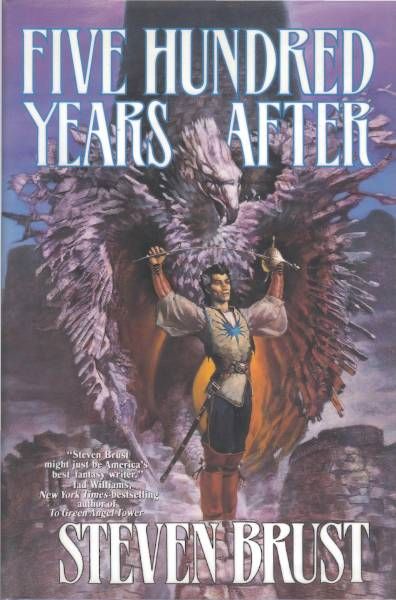More Intrigue, sorcery, intrigue, swashbuckling adventure and intrigue
Five Hundred Years After (Khaavren Romances, volume 2)
By Steven Brust

19 Nov, 2014
0 comments
As one might guess from the title, 1994’s Five Hundred Years After picks up with Khaavren and friends half a millennium after the events of The Phoenix Guard. Dragaerans are very long lived and so rather than having been dust for four centuries, Khaavren has merely matured into a comfortable middle-age as the respected commander of the Phoenix Guard. All of his old companions, Tazendra, Pel, and Aerich, have also found lives suitable to their characters.
spoilers
Unfortunately for the Dragaeran Empire, Emperor Tortaalik has also found a role suitable for his character, as a negligent, arguably decadent ruler utterly dependent on his subordinates to run the Empire. Phoenix reigns begin well but generally end badly, Since Tortaalik is the 18th Phoenix Emperor, 18 being numerically significant to Dragaerans, it could be expected that the end of reign will be particularly spectacular. Tortaalik will more than live up to expectations.
In its early stages, the final crisis of Tortaalik’s reign seems mundane: annoying, but the sort of problem long-lived emperors would have to face. The Empire is suffering under a long drought. While the Empire has the tools to deal with it, what it does not seem to have, as far as Tortaalik can tell, is a way to finance ending the drought without making concessions he does not care to make. Each of the Dragaeran Houses is proud and each has its own agenda. While a competent Emperor could convince each of them to sacrifice a little for the good of the Empire, Tortaalik is not that Emperor.
If he had been, perhaps the Empire would have weathered the storm — or perhaps the Cycle would have turned and the Phoenix Emperor would have been induced by peaceful means to step aside for the Dragon Heir. But an outside force intervenes. The mysterious Greycat, who is too cunning by half, sees the Empire’s current difficulties as a personal opportunity for revenge and personal advancement. He sets out to push the crisis in a direction he believes will be personally advantageous and starts with a wave of assassinations.
Khaavren survives the attempt on his life due to good luck but Gyorg Lavode, former Phoenix Guard Brigadier G’aereth and a seemingly minor functionary named Smaller (who happens to be the only person with a firm idea of the Empire’s finances) are not so lucky. The killings make it clear that there is a conspiracy of vast extent and unknown purpose afoot. Khaavren and his friends and allies find themselves fighting shadows.
One shadowy conspiracy is bad enough, but, as it happens, the Dragon Heir, Adron, is an ambitious and easily affronted man who prefers action to patient waiting. Adron is just the sort of person who would react to insults and an Empire in increasing disarray by using the tools at his disposal to help the Cycle turn a little faster. Adron has his own army and a command of the forbidden Elder Sorcery that is almost sufficient for his needs. What he does not have is a sense of timing, a lack for which the Empire and everyone in it will pay dearly.
It’s been so long since I read the Jhereg books that I no longer remember if a reader picking this up would have had the information necessary to pick up on the significance of the timing of Greycat’s conspiracy. I am pretty sure that there was at least a general sense in the Jhereg books of how well Adron’s plans played out in the long run.
The plot is a tribute to how hard-working people operating at cross-purposes can turn an otherwise conventional setback into a calamity worthy of legend. Greycat’s poorly considered attempt to betray a talented subordinate deserves special attention here; it might have been inspired by the fact that Greycat’s minions have a talent for getting themselves killed while failing to kill their target. However, Greycat does not seem to have given much thought to how events could play out if the talented assassin he sent out to fail in a very particular way managed to survive the attempted sacrifice.
Since I have not read Dumas’ Twenty Years Later, I cannot comment on the parallels between that book and this one.
The style of this book is similar to the flowery prose of the first, but the tone seems a lot darker. That’s probably because The Phoenix Guard is a triumph while this volume is a tragedy of malice and misplaced ambition.
The book is presented as another one of Paarfi’s attempts at writing historical fiction. The preface suggests that his previous attempts were not greeted with the adulation he felt he deserved1. The About the Author, presented as an interview between Paarfi and Brust, suggests their relationship was not entirely without friction, although, since there are three more books in the series, I suppose they got past that friction.
While looking up the publication date for this, I noticed that as far as the ISFDB knows, Brust has never won a major SF award and has not even been nominated since 1999. That seems counterintuitive. I enjoyed this when I read it a generation ago and a reread has not diminished my regard for it.
Five Hundred Years After is available from Orb Books.
1: Some portions of the preface felt like a joke I lacked sufficient background information to properly appreciate.
